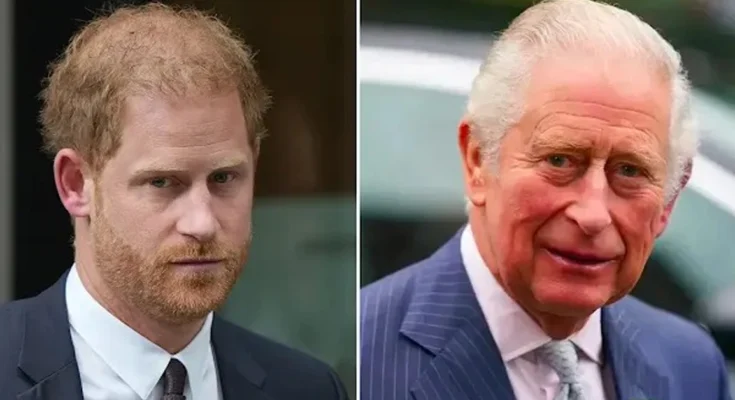In a shocking twist that has captivated both royal watchers and the general public, new revelations about Prince Harry’s mindset and past actions have emerged. According to insiders and reports, Harry grappled with deep-seated paranoia regarding his lineage, which led him to believe that King Charles III was not his biological father. This belief fueled a series of dramatic plots to oust his father from the royal family, contributing to the growing rift within the monarchy.
This article delves into the layers of Harry’s psychological struggle, the impact of his beliefs on his relationship with his family, and the broader implications for the British monarchy. By examining these revelations, we gain insight into Harry’s tumultuous journey and the ongoing tension between him and the royal family.
1. The Roots of Paranoia
The roots of Prince Harry’s paranoia can be traced back to his childhood. Growing up in the public eye, Harry faced relentless scrutiny and speculation about his life and lineage. The tragic death of his mother, Princess Diana, in 1997 left a profound impact on him. Following her passing, rumors swirled around the circumstances of her death and the relationships within the royal family. This environment of speculation and emotional turmoil likely fueled Harry’s insecurities.
Harry’s belief that King Charles wasn’t his biological father reportedly stemmed from a combination of family dynamics, media narratives, and his own struggles with identity. The whispers about his parentage, especially those surrounding his mother’s affairs, created a chasm of distrust between him and his royal family. These doubts manifested in a mindset that made him question everything, including his father’s love and authenticity.
2. The Aftermath of His Mother’s Death
Diana’s death had a profound effect on Harry and his brother, Prince William. As they navigated their grief, both brothers experienced a fracture in their relationship with the royal family. For Harry, the loss of his mother heightened his feelings of abandonment and loneliness.
In interviews, Harry has openly discussed his struggles with mental health, including anxiety and depression. These issues compounded his paranoia, making it difficult for him to connect with his family and trust those around him. The feeling that he had to fend for himself often left him feeling isolated, leading to a sense of paranoia regarding his place in the royal family.
3. The Role of the Media
The British media’s portrayal of Harry has also played a significant role in shaping his paranoia. From a young age, he was the subject of tabloid speculation and scrutiny. This media frenzy not only affected his public image but also impacted his mental health.
As rumors regarding his lineage persisted, they seemed to validate his insecurities. The more the media speculated, the more Harry felt the need to protect himself and his family. He began to perceive the royal family, including his father, as adversaries rather than allies, leading to a series of desperate actions to distance himself from them.
4. The Plots to Oust Charles
Reports suggest that Harry’s paranoia reached a tipping point, leading him to entertain plots to oust King Charles from his position as monarch. These plans were reportedly motivated by a desire to regain control over his life and assert his independence.
- Seeking Autonomy: Harry’s plots were rooted in his desire for autonomy from the royal family. He sought to carve out a space where he could raise his family away from royal scrutiny and expectations. This longing for freedom intensified his belief that he needed to act against his father.
- Engagement with Alternative Groups: In his quest for independence, Harry reportedly explored affiliations with various groups and individuals who criticized the monarchy. This engagement further fueled his paranoia, as he found support from those who shared his views about the royal family.
- Public Statements: Harry’s willingness to speak out against the monarchy has also been seen as part of his efforts to undermine Charles’s authority. His candid discussions in interviews, especially those addressing his childhood and family dynamics, have contributed to the narrative that he seeks to redefine his relationship with the monarchy.
5. The Impact on Family Dynamics
Harry’s actions and beliefs have undeniably affected his relationship with the royal family. The growing rift between him and his family members, particularly King Charles and Prince William, has been a focal point in recent years.
- Strained Relationship with Charles: The relationship between Harry and his father has been strained, marked by misunderstandings and a lack of communication. Harry’s paranoia has contributed to a perception that Charles is an adversary rather than a supportive figure.
- Brotherly Rift: The tension between Harry and William has escalated due to Harry’s belief that the royal family has failed to understand his struggles. William has often expressed concern for his brother, but Harry’s distrust makes it challenging for them to reconnect.
- Impact on Meghan: Harry’s paranoia has also impacted his marriage to Meghan Markle. The couple has faced immense pressure from both the media and the royal family. Meghan has often defended Harry’s actions, emphasizing the toll that royal life has taken on his mental health. This dynamic adds another layer of complexity to their relationship with the royal family.
6. Public Reactions and Implications
The revelations about Harry’s beliefs and actions have ignited a range of reactions from the public and royal observers. Some view Harry’s struggles with sympathy, understanding the toll that royal life can take on mental health. Others criticize him for his perceived disloyalty to the institution that has shaped his life.
- Support for Mental Health Awareness: Many fans and advocates for mental health have rallied around Harry, praising his openness about his struggles. His willingness to discuss these issues has contributed to broader conversations about mental health and well-being.
- Calls for Family Unity: Some royal observers have called for reconciliation within the royal family. They argue that the monarchy must address these issues internally to move forward and restore unity.
- Media Scrutiny: The revelations have drawn significant media attention, leading to increased scrutiny of both Harry and the royal family. Discussions about privacy, mental health, and royal responsibilities have resurfaced as key issues in the ongoing narrative surrounding the monarchy.
FAQs
1. Why does Prince Harry believe King Charles is not his biological father?
Harry’s belief stems from childhood trauma, media speculation, and family dynamics that have led him to question his lineage and relationship with his father.
2. How has Harry’s paranoia affected his relationship with Prince William?
Harry’s paranoia has created a rift between him and William, making it difficult for them to connect and communicate effectively.
3. What role has the media played in Harry’s struggles?
The media’s constant scrutiny and speculation have fueled Harry’s insecurities, leading to a lack of trust in those around him, including his family.
4. Has Prince Harry sought help for his mental health issues?
Yes, Harry has been open about his struggles with mental health and has sought help through therapy and other support mechanisms.
5. What are the implications of Harry’s beliefs for the British monarchy?
Harry’s beliefs and actions raise important questions about mental health, family unity, and the future of the royal family, prompting discussions about how the monarchy can evolve to address these challenges.



